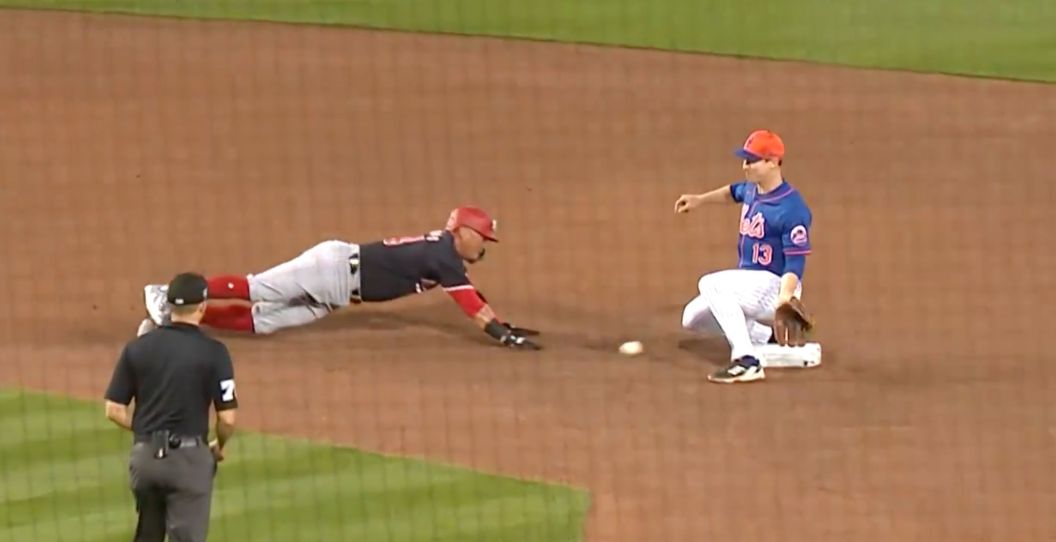Major League Baseball has recently made sweeping changes to the sport, including implementing a pitch clock, checking pitchers for sticky substances, increasing base sizes and limiting the number of pickoffs a pitcher can take, to name a handful.
Videos by FanBuzz
With the 2024 season comes new rules — like widening the runner's lane to first base to include the space between the foul line and infield grass — and another pretty important point of emphasis: cracking down on infielder obstruction.
We saw it in a Spring Training game between the Washington National and New York Mets Thursday night, when Mets second baseman Joey Wendle was called for obstruction on a pickoff attempt at second base. Wendle was blocking the base, and Washington's Ildemaro Vargas was not only ruled safe but awarded third base on the play.
New rule for 2024: baserunners are awarded an extra base if fielders block the bag on pickoffs
Joey Wendle got called for it here pic.twitter.com/kCQ57gGMpp
— Talkin’ Baseball (@TalkinBaseball_) March 8, 2024
This isn't a new rule, but rather a focus of enforcement for MLB this season. This could be a major development considering the most likely plays it will affect are pickoffs to first and second base, where it's common for fielders to drop a leg down to block the baserunner from reaching the base, and at third base, where third basemen often block an advancing runner's path to the base.
According to the MLB rulebook, rule 6.01(h) states that "the obstructed runner shall be awarded at least one base beyond the base he had last legally touched before the obstruction," which is why Vargas was given third base.
This play is already dividing baseball fans on social media. Some think fielders should be allowed to block the base on plays like this, while some don't agree with awarding the runner an extra base.
"I was ok when they changed the rules for catchers blocking the base to reduce collisions at home on bang bang plays, but this is going too far, pickoff's aren't collision plays, the base runner doesn't 'have the right to have a clear path back to the base,'" one X user wrote.
I was ok when they changed the rules for catchers blocking the base to reduce collisions at home on bang bang plays, but this is going too far, pickoff’s aren’t collision plays, the base runner doesn’t “have the right to have a clear path back to the base”
— Jared Grossman (@Jared_Grossman5) March 8, 2024
"Theyre literally taking the art and skills of being a great middle infielder away. Cant block anything anymore. Learn how to slide head first and move your hands to swim around," another wrote.
https://twitter.com/sportsgirl323/status/1765893753225519378
"Like the rule, don't like the penalty. He shouldn't get an extra base, I feel like calling him safe is good enough," one wrote.
Like the rule, don't like the penalty. He shouldn't get an extra base, I feel like calling him safe is good enough
— Andrew (#CLERokians) (@manzosmustache) March 8, 2024
It's not surprising MLB has chosen to focus on this for a couple reasons.
For one, it will reduce injuries. When White Sox outfielder Luis Robert Jr. slide head first into Detroit Tigers infielder Jonathan Schoop's leg on a steal attempt in 2022, he sprained his left wrist. This enforcement has the potential to thwart those injuries, much like the Buster Posey rule at home plate was intended to do.
These obstruction calls will also encourage more aggressive base-running, which MLB sees as a positive for the game considering its taken other steps to encourage stealing. The league saw 3,503 stolen bases in 2023, up from 2,486 in 2022.
One thing to note about these obstruction calls are they are not reviewable, which may not sit well with some managers.
Whether these calls make the game better or worse remains to be seen, but you have to give MLB credit for attempting to make the game safer and more exciting.
